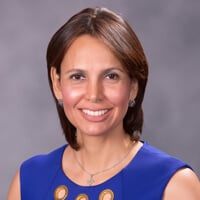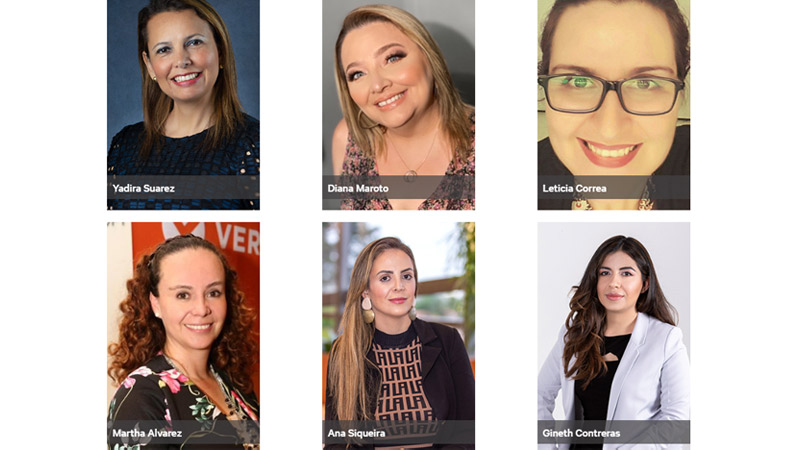We must develop leadership skills among girls from a young age and build self-esteem so that they can challenge stereotypes and trust in their ability to seize any opportunities that arise. This is the best advice for young women interested in science, technology, engineering and math (STEM) careers. International Women’s Day is an ideal occasion to chart women’s participation in these disciplines.
After twenty years working in the technology sector, I am convinced that STEM education needs to be encouraged. Now more than ever, women must be prepared to face new challenges and opportunities. We need professionals with the ability to solve problems, to innovate and to explore exploit the possibilities offered by this sector.
Before coming to Vertiv, my direct bosses have always been men, but in 2019 after the organization´s reconstruction, I had a woman as boss. At first, I thought it would be difficult to adapt to female leadership, but it has been great, she has shown greater empathy while taking decisions and a better understanding during emotional situations. For example, when I got sick from Covid, she was 100% aware of my recovery and supported me with the follow-up of the actions I was leading during my absence.
Gradually, women have made their way into the world of science, both in research positions and in positions of leadership and innovation that have benefited scientific advancement, but it has taken much time and there is still a long way to go.
For example, as the magazine Muy Interesante points out, some of the first voice recognition systems were calibrated for male voices, meaning that women’s voices were not recognized. This shows that technical decisions have been based exclusively on men’s experiences, opinions and judgments, often overlooking the needs of women.
To make lasting and pervasive changes, it is very important that the wealth of possibilities in STEM careers be shown and modeled from an early age and throughout the educational system. It should be demonstrated that these opportunities are not only for men, presenting success stories such as Diana Trujillo, Colombian aerospace engineer and leader of the NASA Curiosity mission.
Adriana Angarita, a Systems Engineer and former leader of the Association of Private Universities of Panama, agrees that education from an early age is crucial. “We must encourage boys and girls to understand that each of them has to make a decision and it is possible to overcome adversity and achieve the end result, a career in STEM. We have to help empower girls to free themselves from their fears, to realize that they do not have to be perfect and that they have to listen to themselves, investigate the area that most appeals to them and, above all, believe in their abilities.”
According to the study Women in Science, Technology, Engineering and Mathematics in Latin America and the Caribbean, by Alessandro Bello, only 30% of women in the region are STEM students. By 2050, 75% of jobs will be in this sector, which is why it is increasingly necessary for both families and educators encourage young people to take an interest in these areas of study.
María Noel Vaeza, UN Women Regional Director for the Americas and the Caribbean, mentions in this study that STEM disciplines are key to addressing some of the main challenges of the 2030 Agenda for Sustainable Development, from improving health and combating climate change to gender equality at all levels.
|
Advice from a PhD Student
* Valentina Rangel, PhD student in the Malaker Lab, Department of Chemistry, Yale University. |
According to the professionals consulted, women sometimes spend many years training in science-related fields, especially in engineering, but leave the sector before reaching managerial positions because they feel that there are fewer opportunities for development, lower salaries and less exposure at work.
Now that technological tools have taken on an important role in the new normal of Covid-19, all of society, especially those involved in fostering new talent, should insist on the need to awaken curiosity in children and young people to continue using technological tools for the benefit of their development and acquiring the skills that the future will demand.
At Vertiv, we are convinced that the inclusion of more women can help meet the need for qualified professionals in this field. That is why we aim to empower and encourage female students in STEM fields to be a part of the data center industry through various initiatives supported by mentoring and tutoring, and also organized the Mpowerment week for Latin American´s marketing team, to empower and help them with their personal and professional growth, which has contributed to create a community within the members of the organization, sharing experiences and best practices.
It is vital that the technology industry creates inclusive and equal opportunities for women in this sector. Science has no gender, and these steps are needed for society’s wellbeing and development. Let’s raise awareness among young people so that they believe in their abilities and develop their full potential.
In addition, it is important to continue strengthening public policies on science and technology in order to consider gender issues and promote incentives so that women do not have to decide between motherhood and their work, as well as ensuring equal opportunities and comprehensive education from childhood.
For more information, click here.






